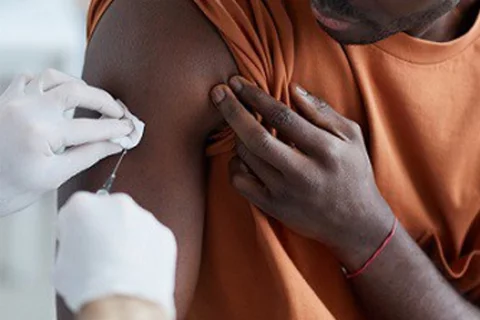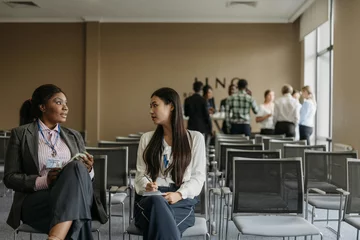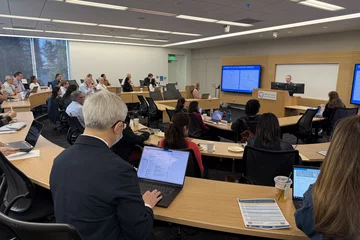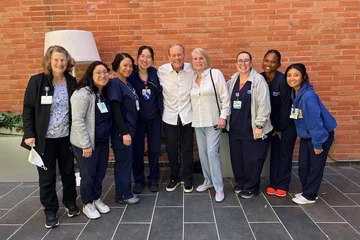A community partnered approach for diversity in COVID-19 vaccine clinical trials

During the summer and early fall of 2020, UCLA and Harbor-UCLA/Lundquist were charged with rapidly improving the diversity and participation of groups in Los Angeles with a high risk of COVID-19 exposure and/or worse COVID-19 clinical outcomes as part of NIH-sponsored Phase 3 COVID-19 vaccine trials.
However, challenges included gaining community trust, improving community engagement in clinical trials among historically underrepresented groups, and effectively communicating the unknown risks and benefits of COVID-19 vaccines and clinical trial participation. Enrollment was to be done on urgently compressed timelines, requiring an unprecedentedly short interval for community partnering and engagement.
A Community Solution
As shared in a recent publication in the Journal of Clinical and Translational Science, a UCLA COVID-19 Community Consultant Panel (CCP) was established in June 2020 to consult on outreach, education, and recruitment plans for local implementation of Operation Warp Speed/NIH-sponsored COVID-19 vaccine trials. Rapid community engagement and trust-building strategies included creating a toolkit on the basics of clinical trials, weekly updates and education on clinical trial processes as well as COVID-19 vaccine landscape information, and weekly reflections.
Existing community partnerships, including established partnered relationships and trust with the UCLA Clinical and Translational Science Institute, were leveraged for rapid member outreach.
The CCP met weekly in the summer of 2020 to provide input to the locally implementing partners for the AstraZeneca and Moderna trials from three sites in Los Angeles. Thirteen CCP members were recruited, representing over 13 community-based organizations, and included expertise ranging from essential/frontline workers (grocery store employees, healthcare workers, community health workers), leadership of community-based and faith-based organizations, and community leadership/key stakeholders in their respective communities (Latinx, Black/AA, Asian/Pacific Islander). Compensation for CCP members was established and commensurate with their time commitment and the frequency of meetings, expedited timeline, deliverable outputs, and pandemic hardships experienced by community members.
Working closely with the local investigators for the vaccine studies, the CCP provided critical insight on best practices for community trust building, clinical trial participation and reliable information dissemination regarding COVID-19 vaccines and COVID-19 therapeutic clinical trials. As efficacy and safety were established for COVID-19 vaccines—and vaccination accessibility for racial and ethnic minority communities in Los Angeles County became an additional concern—CCP meetings and insights provided a bidirectional mechanism for consistent communication between researchers and communities most impacted by COVID-19.
The role of the CCP members transitioned to addressing other emergent COVID-19 topics, including vaccine hesitancy, concerns about late-emerging side effects, politicization of science, and global vaccine equity.
Opportunities for transformation in community partnerships
The CCP provided critical and timely insight into the community-centered barriers to COVID-19 vaccine trial participation, including social determinants of health, historical mistrust issues, clinical trial literacy, structural barriers, and identifying trusted and reliable sources of information. The CCP's input led to significant changes in cultural tailoring of recruitment materials, recruitment messaging and messengers, additional needs to assure equity and accessibility in clinical trial participation; these included provision of transportation, protocols to support linkages to care in case of an adverse event, protocols for cultural competence, and the importance of “customer service” to clinical trial participants.
Challenges to clinical trial participation which were unable to be resolved included childcare, requests for weekend and/or after-hours appointment availability, and more geographically desirable or mobile locations for trial visits. Outcomes from these trials led to majority-minority participants (over 60%) in each of the three vaccine clinical trials.
This research was supported by UCLA CTSI, NIH CEAL/STOP COVID-19 CA, and NIH/NIAD UM1 AI069424-16 . CTSI co-director and leader of the Community Engagement and Research Program, Dr. Arleen Brown, and Dr. Raphael Landovitz served as the UCLA leaders. Additional co-authors include clinical trial staff and investigators, plus CTSI Community Engagement and Research Program staff and faculty who assisted in the development of the CCP and supported community outreach and COVID-19 education during the trial.
Image caption: iStock.com/SeventyFour
Image source:



